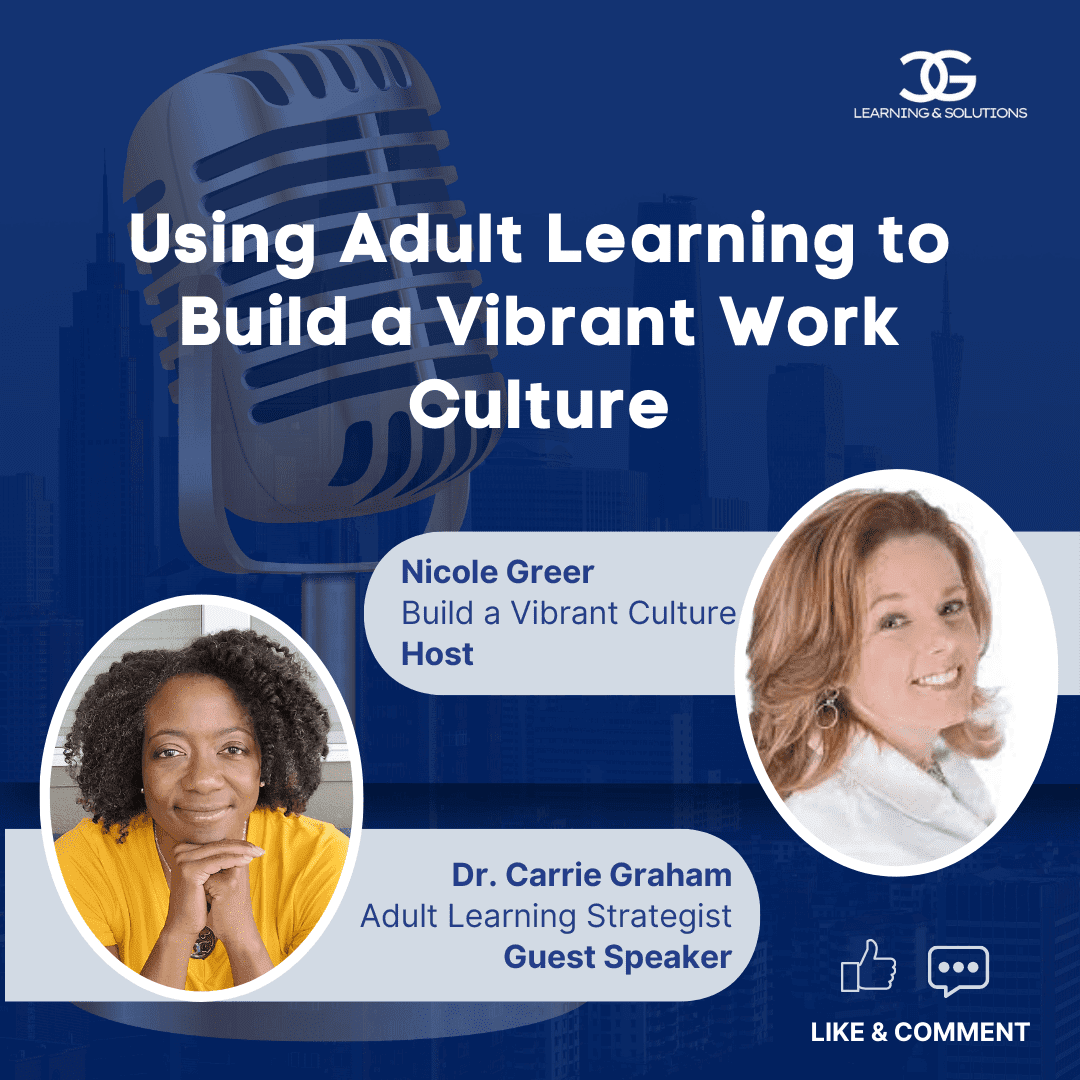Episode Overview
This episode of Vibrant Culture hosted by Nicole Greer features Dr. Carrie Graham, an adult learning strategist and training consultant, discussing how adult learning principles can transform both personal and professional development while creating vibrant organizational cultures. The conversation explores the strategic approach to customizing training programs and the critical role of leadership in fostering learning-centered environments.
Listen Here > https://youtu.be/ikGOPICq6Tk?si=0l9Ao75rslKWl5Pf
10 Key Points
- Individualized Training Approach: Effective training and development requires customizing programs to meet the needs of individuals rather than treating employees as a collective group, moving beyond generic information dumps.
- Employee Buy-in Through Prioritization: When organizations make people the priority in training rather than just content or production outcomes, employees demonstrate increased commitment to the organizational vision.
- Leadership Beyond Position: Leadership qualities and behavior are not solely defined by position or title, emphasizing the importance of developing leadership skills across all organizational levels.
- Barriers and Challenges Recognition: Understanding and addressing the specific barriers and challenges that adults face in learning environments is crucial for successful professional development plans.
- Active Learning Engagement: Effective training programs must include learners through activities and discussions rather than passive information consumption, ensuring better retention and application.
- Application-Centered Learning: The significance of practical application in the learning process ensures that training and development translates into real workplace improvements and skill development.
- Structural Consistency: Creating systematic structures and processes for consistency and quality in training and development programs leads to more reliable outcomes and employee growth.
- Adult Learning as Personal Transformation: Adult learning principles can impact personal life beyond professional development, creating holistic growth opportunities for individuals.
- Leadership's Cultural Role: Leaders play a critical role in training and development by creating and maintaining a culture that values and actively supports adult learning initiatives.
- Customization Over Standardization: Moving away from one-size-fits-all approaches to training allows organizations to empower employees more effectively by addressing their specific learning needs and professional development goals.
10 Takeaways/Action Items
- Conduct Individual Learning Assessments: Analyze the specific learning needs of each employee rather than implementing blanket training solutions across your organization.
- Redesign Training Priorities: Shift focus from content delivery to people-centered approaches in your professional development plan, making individuals the primary consideration.
- Identify Learning Barriers: Systematically identify and address the unique challenges that adult learners in your organization face during training and development programs.
- Implement Active Learning Methods: Replace passive training sessions with interactive activities and discussions that engage participants and improve knowledge retention.
- Create Application Opportunities: Build practical application components into all training programs to ensure skills transfer from learning environments to actual work situations.
- Develop Leadership at All Levels: Focus on developing leadership qualities in employees regardless of their current position or title within the organizational hierarchy.
- Establish Quality Control Systems: Create consistent structures and processes for your training and development initiatives to ensure reliable, high-quality learning experiences.
- Measure Employee Commitment: Track changes in employee buy-in and commitment to organizational vision as indicators of effective adult learning implementation.
- Train Leaders as Learning Champions: Empower employees in leadership positions to actively support and champion adult learning initiatives throughout the organization.
- Customize Professional Development Plans: Move beyond standard training approaches to create individualized professional development plans that address specific employee needs and career goals.
Key Focus Areas
- Training and Development: Strategic customization of learning programs
- Leadership Skills: Development across all organizational levels
- Employee Empowerment: People-centered approach to professional growth
- Organizational Culture: Creating environments that support continuous learning
- Professional Development Planning: Individual-focused growth strategies
Resources
-------
Vibrant Culture
Nicole Greer, CSP
https://www.linkedin.com/in/build-a-vibrant-culture-nicole-greer
https://vibrantculture.com
